- Home
- Pet Food Guides
- Best Food for Labradors: What to Feed Your Lab Pup & Dog?

Best Food for Labradors: What to Feed Your Lab Pup & Dog?
Labradors are probably the most popular dog breed in the world. And for good reason, as labs tick all the boxes of a perfect family dog. They are incredibly loyal, easy to train, intelligent, full of joy, and great with children.
Oh, and they love food. And by love, we mean love, love.
It’s no secret that labs are willing to do everything for a piece of anything edible, even if it’s not good for them. As a dog parent, it’s your job to ensure your labrador’s dietary needs are met. That involves keeping it away from your dinner leftovers, of course, but, most importantly, making sure it only eats the appropriate and nutritious dog food.
That brings us to the main question of this guide: what is the best food for labradors? Let’s uncover the secrets of a healthy labrador’s diet.
 Understanding Your Labrador’s Nutritional Needs
Understanding Your Labrador’s Nutritional Needs
The first step toward ensuring your labrador stays healthy is understanding its nutritional needs at various stages of its life. Like any other breed, labradors’ dietary needs change with age, requiring you to adjust their diet accordingly.
Here’s a quick breakdown of what your lab needs at various stages of its life:
Labrador Puppy (Up to 12 Months)
During the first stage of your lab’s life, the diet should focus on fostering healthy growth and development. The best food for lab puppies should therefore contain:
- High-Quality Protein: Growing pups need plenty of protein for muscle and bone development.
- Moderate Fat: Fat provides energy for growing pups, but avoid overdoing it. Labs are prone to obesity, so choose a food with moderate fat content.
- Balanced Calcium & Phosphorus: This is crucial for proper bone development. A 1:1 ratio is ideal.
- Lower Calorie Density: Rapid growth doesn’t require excessive calories, so keep their density low.
Adult Labrador (1 – 7 Years Old)
As your labrador grows into an adult dog, its nutritional needs shift. Your job at this stage is to keep your lab’s weight healthy to help it maintain appropriate energy levels, as well as proper joint and muscle health. Adult labs tend toward obesity, so be sure their dog food contains the following:
- High-Quality Protein: Protein remains important for maintaining muscle mass and energy levels.
- Moderate Fat: Labs are active dogs, but again, moderate fat is key to avoiding weight gain.
- Fiber for Digestion: Fiber helps with digestion and keeps your lab feeling full.
- Omega-3 Fatty Acids: These promote healthy skin and joints, especially beneficial for this active breed.
Senior Lab (Over 7 Years Old)
Labradors enter their senior stage when they are around seven years old. Once again, their nutrition needs change, calling for a diet that aims to support their weight and joint management, maintain cognitive function, and aid in digestion. To help ensure this, consider the following when choosing the best food for your senior lab:
- Easily Digestible Protein: Senior labradors may have trouble digesting rich protein sources. Look for easily digestible proteins like chicken or fish.
- Lower Fat & Calories: Senior labs are less active, so reduce calorie intake to prevent obesity.
- Joint Supplements: Glucosamine and chondroitin can help with joint health, a common concern for senior labs.
 Best Food for Labradors: Nutrition Tips & Considerations
Best Food for Labradors: Nutrition Tips & Considerations
The age isn’t the only thing to consider when searching for the best food for your labrador. There are several lab-specific health concerns you should also keep in mind, such as:
- Obesity: Labradors tend to get chunky when they overeat. The issue here is that, as covered (and as you’ll quickly notice), they love food, which is actually something they owe to their genetics. Long story short, be careful and pay close attention to what you feed your labrador, as well as how often and how large the portions are.
- Joint and Bone Issues: Labradors, especially older ones, often struggle with bone and joint health, such as arthritis and weak bones. With that in mind, look for dog food rich in glucosamine, chondroitin and omega-3s.
- Heart Problems: Labradors, predominantly male, can develop Trisuspid Valve Dysplasia (TVD), a congenital condition that affects flow within the heart, often leading to fatigue, coughing, lack of appetite, difficulty breathing, and weight loss. Obesity is another common reason for heart-related issues in labs.
- Eye Concerns: Labs are genetically predisposed to certain eye conditions, especially Canine Progressive Retinal Atrophy (PRA) and cataracts. Be sure to keep that in mind, perform regular health checks, and adjust your lab’s diet accordingly to provide it with the necessary nutrition.
As for the foods you should avoid, it’s generally best to keep ingredients difficult to digest, such as fillers, highly processed foods and artificial preservatives, out of your lab’s diet. Be also careful with corn, soy, natural flavours, and animal byproducts. All these are common allergens.
In general, the best idea is to consult your lab’s dietary needs with your vet. They will be able to provide you with a personalised diet that will keep your lab healthy and full of joy for the entirety of its life.
Best Food for Labs: MutzNutz Top Picks
With the basics covered, here are our top picks for the best food for labradors:
Best Food for Labrador Puppies
#1 Hunters – Large Breed Puppy Salmon & Potato
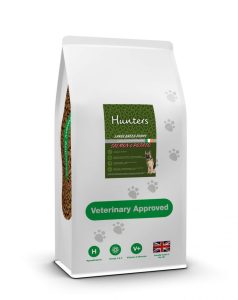 |
Our Rating: 5/5
Main Protein Source: fish Key ingredients: salmon, potatoes, omega 3s and 6s, zinc, and biotin Type: Dry Food Best for: labrador puppies Why we love it:
|
#2 Return to the Wild – Grain-Free Puppy – Salmon with Haddock, Blue Whiting, Sweet Potato and Asparagus
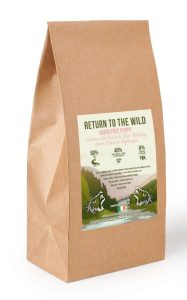 |
Our rating: 5/5
Main protein source: fish Key ingredients: 60% salmon, blue whiting, sweet potato, asparagus, seeds, and vitamins Type: dry food Best for: Labrador puppies Why we love it:
|
#3 Canagan Puppy Feast Grain-Free
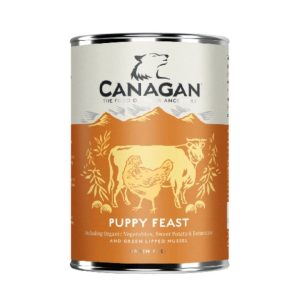 |
Our rating: 5/5
Main protein source: meat Key ingredients: 35% free-run chicken, 30% beef, sweet potato, botanicals, and green-lipped mussel Type: wet food Best for: labrador puppies Why we love it:
|
Best Food for Adult Labradors
#1 Forthglade Adult Dog – Salmon, Potato & Vegetables
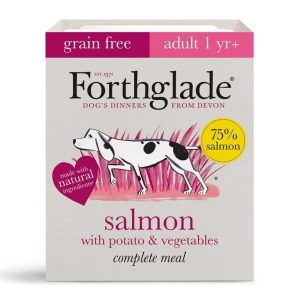 |
Our Rating: 5/5
Main protein source: fish Key ingredients: 75% salmon, potato, carrots, peas, 10% crude oils and fats Type: wet food Best for: adult labradors Why we love it:
|
#2 Return to the Wild – Grain-Free Adult Large Breed – Salmon, Trout, Sweet Potato and Asparagus
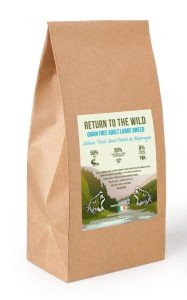 |
Our Rating: 5/5
Main protein source: fish Key ingredients: 50% fish (salmon and trout), 50% vegetables, seeds and supplements Type: dry food Best for: adult labradors Why we love it:
|
Best Food for Senior Labradors
#1 Burns Adult & Senior Weight Control – Chicken & Oats
 |
Our Rating: 5/5
Main protein source: meat Key ingredients: 40% oats, 17% chicken, 18% brown rice, and minerals Type: dry food Best for: adult and senior labradors Why we love it:
|
#2 Canagan Complete Wet Food – Grain-Free Senior Fest
 |
Our Rating: 5/5
Main protein source: poultry Key ingredients: 40% chicken, 20% turkey, vegetables (sweet potato, carrots, peas, broccoli) Type: wet food Best for: senior labradors Why we love it:
|
How Much to Feed Labradors?
Keeping your labrador in tip-top shape starts with a smart feeding plan, which depends on your lab’s age, energy levels, and weight.
On average, labradors need about 30 calories per pound of their weight. So, a grown-up lab around 70-80 pounds would need roughly 2100-2400 calories daily. How active your lab is also plays a huge role here. Couch potato labradors who enjoy a relaxed life might need fewer calories, while sporty and active labs will need more fuel for their active bodies.
Overeating can lead to labradors packing on pounds, so keeping an eye on their portions is important, especially if you want to maintain their sleek build.
 Final Remarks
Final Remarks
There are many things to consider when shopping for the best food for your labrador. This can be overwhelming, which is why we hope our above guide proves itself useful. Keeping our tips in mind and shopping for the brands listed above is your best shot at ensuring your labrador receives all the vitamins and minerals needed at every stage of its life.
Shop for the best food for labradors at MutzNutz today, and remember to always consult the veterinarian when making changes to your dog’s diet.











